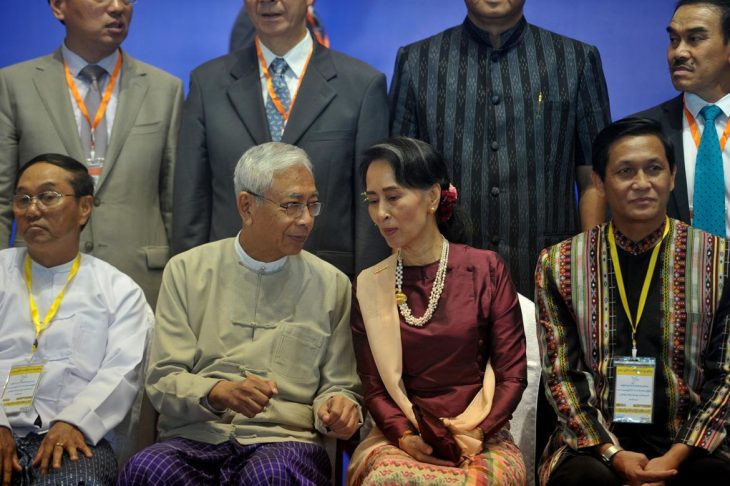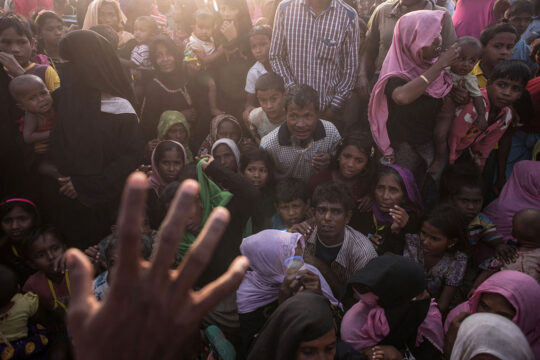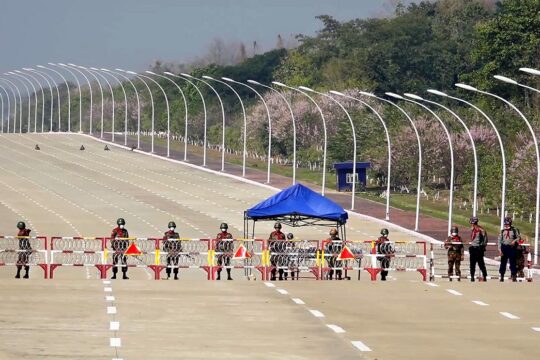One of Myanmar’s leading non-state armed groups has urged the government to find a “politically dignified and nonviolent” resolution to the humanitarian crisis in Rakhine State, warning that failure to do so could jeopardise the government’s peace process.
On Sunday, the second anniversary of the Nationwide Ceasefire Agreement, the Karen National Union released a statement reaffirming its commitment to ending Myanmar’s decades-long history of civil conflict through political dialogue.
However, it went on to criticise the northern Rakhine security crackdown that began in August, noting the parallels between events there and counterinsurgency campaigns conducted by the military elsewhere in Myanmar.
“The handling of the crisis in northern Rakhine by the government and the Tatmadaw (Myanmar army) brings the memory of what the KNU and the Karen people have experienced … through various forms of military operations,” the statement read. “The KNU regrets witnessing the repeat of this history while efforts to achieve peace are being made, and is gravely concerned the peace process will be derailed.
“Therefore, the KNU urges the government and Tatmadaw to seek politically dignified and nonviolent ways to address the current crisis.”
Sunday’s statement is the first formal comment by an NCA signatory on recent events in Rakhine.
Karen women speak out
The Karen Women’s Organisation, an affiliate of the KNU, released a statement on September 19 calling on the Pyidaungsu Hluttaw (parliament) and State Counsellor Daw Aung San Suu Kyi to condemn the military’s “actions against the Rohingya”.
More than half a million refugees – mostly Muslims who identify as Rohingya – have fled northern Rakhine in the weeks after militant attacks on security posts on August 25.
A report this month by the UN Office for the High Commissioner for Human Rights alleged that the Tatmadaw response to the attacks was designed to drive out the Rohingya population from the state’s north, and prevent the return of refugees through the use of landmines and the destruction of villages and farmland.
Myanmar’s government and armed forces have denied allegations of ethnic cleansing, instead accusing refugees and international media outlets of fabricating claims of atrocities.
Founded in 1947, the KNU fought successive Myanmar governments for decades. The civil war drove more than 100,000 Karen refugees across the border into Thailand from the early 1980s, where most remain. The Tatmadaw was accused of numerous human rights violations during this period, including the rape and murder of civilians and the use of forced portering.
Following a series of strategic setbacks and military defeats from the 1990s, the KNU leadership resolved to enter negotiations with the U Thein Sein government (previous government), signing a bilateral ceasefire in 2012. It is the most important signatory to the NCA and has been involved in negotiations to bring non-signatories into the government’s peace process.
Following internal ructions over the KNU’s commitment to the peace process, senior members opposed to formal cooperation with the government were voted out of their leadership positions at the organisation’s 16th congress earlier this year.
Neither KNU vice president Padoh Saw Kwe Htoo Win nor general secretary Padoh Saw Tah Doh Moo were available for comment on Monday.
‘Our road to peace is a marathon’
Elsewhere on Sunday, Aung San Suu Kyi presided over a ceremony in Nay Pyi Taw to mark the NCA’s second anniversary, reiterating her government’s commitment to federal reform of the constitution and claiming the accord had reduced armed clashes in the areas in which its signatories were based.
“Our road to peace is a marathon, and to successfully complete it, we need determination, good attitude and in addition, a will,” she told attendees, which included leaders of the NCA’s signatory groups. “Let us work together to show how much we love and value peace and to face the judgment of our next generation and history without guilt and with honour.”
At the end of a long address, Tatmadaw chief Senior General Min Aung Hlaing issued an ultimatum to the more than a dozen armed groups yet to sign the NCA.
“All armed ethnic organisations must sign the NCA,” he said, according to a transcript of his speech published in state-run media. “I firmly ask you to sign the NCA. No provision in this agreement limits or restricts the rights of people, but provide every possible right for them.
“It is therefore fair to assume that continued ignoring of this fact amounts to resisting the federal Union which people aspire to, opposing democracy, having desire for armed ‘anarchy’, and disregarding the interests of the Union and its people.”
This article was first published by Frontier





